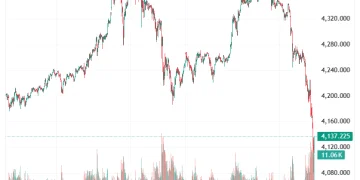Ghana Risks Persistent Price Hikes Without Strong Competition and Anti-Trust Laws, Says CUTS International
The Director of CUTS International, West Africa Centre, Appiah Adomako, has underscored the urgent need for Ghana to pass a comprehensive competition law aimed at curbing price fixing and market dominance in key sectors of the economy.
Speaking during the NorvanReports and Economic Governance Platform (EGP) X Space Discussion on the topic, “Oil Wars, Broken Systems: What The Iran-Israel Conflict Really Means for Ghana’s Revenue, Reserves & Reform Path”, Mr Adomako criticised past government efforts to regulate cement prices without addressing the underlying structural issues of limited competition and cartel-like behaviour in the sector.
“I remember last year, the previous Trade Minister was busy trying to take a regulation to Parliament to control cement prices, and I told the Minister that this regulation will not solve the underlying issue in the industry,” he remarked. “The issue is that these companies have become more like cartels. They are fixing prices, so without competition and anti-trust laws to investigate and sanction companies engaging in price fixing, cement prices will not necessarily come down.”
Mr Adomako stressed the importance of a competition law that would empower authorities to investigate contracts, punish collusion, and reduce market manipulation by dominant players. He noted that the absence of such regulation leaves consumers vulnerable to arbitrary price hikes.
To further promote transparency, he proposed that statistical agencies should not limit their role to tracking inflation but should also monitor prices along the value chain, from port arrival costs through transportation to market prices. Such data, he argued, would empower consumers with knowledge of fair pricing and expose instances of excessive profiteering.
“Statistical surveys can help establish fair benchmark prices for goods like cement. For example, if the data shows that a 20kg bag of cement should not cost more than GHS 80, consumers can make informed choices when prices are artificially inflated to GHS 120,” he explained.
Mr Adomako also raised concerns over the growing influence of trade associations, which he described as operating more like cartel units, manipulating supply and prices to their advantage. He cited instances where “market queens” who are key players in food supply chains, deliberately limit the volume of goods released into markets to drive up prices, to the detriment of ordinary consumers.
“These practices hurt not just the consumer but the entire economy. Until we enact strong laws and ensure enforcement, prices of goods and services will continue to rise regardless of improvements in the cedi or reductions in global prices,” he added.
Echoing Mr Adomako’s concerns during the discussion, Petroleum Economist and Political Risk Analyst, Dr Theo Acheampong, pointed to a deeply ingrained “kalabule” mindset – a reference to the 1980s culture of profiteering and cheating – which still persists among traders and businesses in Ghana today. He noted that even when global prices fall, local prices remain stubbornly high due to this entrenched behaviour.
Participants agreed that bridging the information gap between producers and consumers, coupled with effective legal frameworks, is essential to promoting fair competition, protecting consumer rights, and ensuring price stability in Ghana’s economy.








